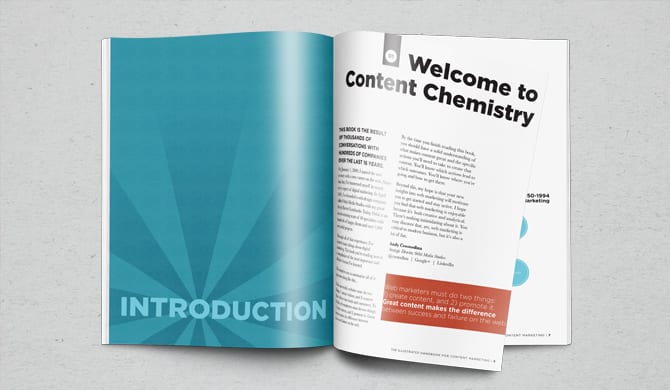And 11 Other Questions About the Most Important Number In Your Marketing
There are a lot of numbers in marketing. Fans and followers, conversions and clickthroughs. Some of these numbers matter more than others. There’s one number that might be the most important number of all: Domain Authority.
This post covers the top questions about this key metric. We’re going to start with the big picture and then get to the more practical. We’ll end with a list of answers to the top question, how can I increase my Domain Authority? If you just want advice about improving your authority fast, scroll down to the bottom.
1. What is Domain Authority?
Domain Authority is a score that indicates the likelihood that pages on a website will rank in search engines. It’s measured on a scale from 1 to 100.
It is created by Moz, but it’s an approximation of the Google “PageRank” score (from 1 to 10) which measured a website’s credibility. (There is an equivalent in every major SEO software: SEMrush has Authority Score, Ahrefs has Domain Rating, etc.)
There isn’t a way to see Google’s PageRank scores anymore, so many search marketers use Domain Authority as a proxy.
Domain Authority (DA) shows how credible a website is among other websites, based on several factors, especially links. If website A links to website B, it’s like a vote of confidence. The link increases the Domain Authority of website B and increases the likelihood that pages on that domain will rank.
2. How is Domain Authority calculated?
The number of linking websites has an impact on Domain Authority. But quality is even more important. Links from websites that have a high Domain Authority themselves pass much more authority to sites they link to.
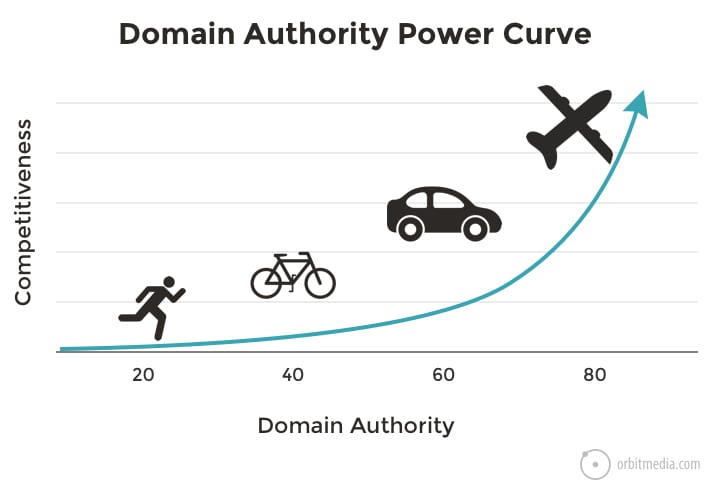
Authority can be plotted on an exponential curve. Sites with higher authority have exponentially more incoming links, and they pass exponentially more authority when they link to other websites.
- Popular daily blogs have DA above 80
- Major media website have DA above 90
- Only a handful of websites have DA of 100 (Wikipedia, Twitter, Facebook, Google)
Of course, Domain Authority is not the only search ranking factor. Sites with lower authority often outrank sites with higher authority. This is because the ranking page may be more detailed, more focused on the search phrase. Web pages need relevance, in addition to authority, to rank well in search engines. More on that below.
3. Does the formula for calculating Domain Authority change? If so, how often?
To answer this question, we’ll need to go to the source. Here’s input from Matt Peters, who works on Mozscape, the index that Domain Authority is based on.
 |
“The algorithm used to calculate Domain Authority has changed over time, but relatively infrequently. The current algorithm has been in production for nearly five years without any major changes. We do occasionally make minor tweaks as needed. Robustness against changes in Google’s algorithm and in the underlying Mozscape link index was a design principle when developing the algorithm.” – Matthew Peters, Director of Data Science, MOZ |
4. Domain Authority vs Page Authority. What’s the difference?
Google doesn’t rank websites. It never did and it never will. Google ranks web pages.
Although Domain Authority shows the likelihood that pages on that domain will rank. The real test is the authority of the specific pages. The real test is Page Authority.
You can think of search engine optimization this way:
- Every search term is a competition
- Every page is a competitor
Pages get their authority in two ways. When a page on another website links to them, they get authority directly. But they also borrow authority from their domain.
5. Where can I check Domain Authority?
You can check the Domain Authority of any website using Link Explorer. It’s a free tool, built into Moz. Just enter a domain and you can see the Domain Authority and part of the “backlink profile” for any domain. With the paid version, you can see all the data.
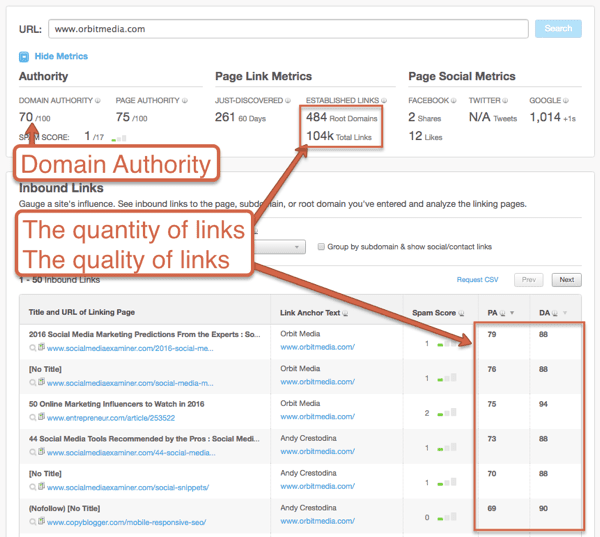
There is a lot of great info on this simple report. It shows the following:
- The Domain Authority of the overall domain
- The Page Authority of the specific page (if you entered the main domain, it shows the authority of the home page. More about Page Authority in a bit)
- The number of websites (Root Domains) that link to you and the total number of links to you from those websites. That’s quantity.
- The authority of each domain and page that links to you. That’s quality.
It’s a lot of good info. But it’s all specific to that one domain name. To understand the competition for any phrase, you’d have to search for the phrase, then enter the domain of each of the high ranking pages into Link Explorer, which would take a while (it would also require the paid version of Moz).
So here’s a way to see the authority of all of the high ranking pages for a given phrase all at once, right there within the search results: use the Mozbar (Chrome extension).
Just install Mozbar, turn it on and search for a phrase. You see the search engine results page (SERP) as usual, but this time you see the authority data right there under each search results.
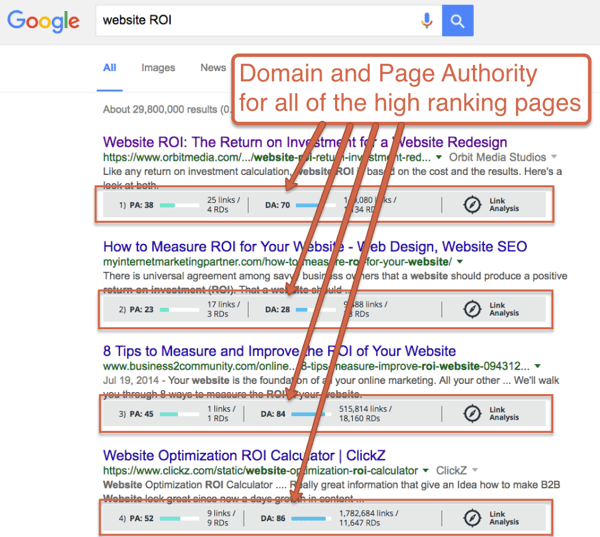
Links are a major factor is Google search results. So, generally speaking, pages and websites with higher authority will rank higher in search results. But this isn’t always the case, as you can see in the screenshot above.
6. What kind of servers and developers does it take to do this stuff?
It’s a major technical challenge to measure the authority of every site on the internet. We asked Matt about the human and technical resources that go into it…
 |
“Running and maintaining the Mozscape index takes a large team of developers and many servers. In addition to the servers used to build the Mozscape index and compute Domain Authority, we have dedicated servers used for crawling, creating a crawl schedule, serving the Mozscape API and a rather impressive number of hard disks and servers just dedicated to storing all the data!” – Matthew Peters, Director of Data Science, MOZ |
7. Why do pages with lower authority outrank pages with higher authority?
Don’t be surprised if less authoritative rank higher than more authoritative pages. Authority is important, but it isn’t the only search ranking factor. Google isn’t that simple. There are dozens of ranking factors, each factor may have dozens of variations.
When a page with lower authority ranks well, it is likely because it performs well in other ways:
- The page is more relevant for the target phrase. It may use the phrase more often in more important places.
- The page is a more detailed, thorough page on the topic. It may be longer or answer more questions.
- The links to the page include the target keyphrase in the link. (exact match anchor text still matters)
- The page is more engaging for visitors and entices visitors to stay longer. (user interaction signals matter)
It’s actually very common for pages with low authority to rank well. There’s more to life than links!
8. What’s a good Domain Authority?
It’s a common question. What is a high Domain Authority? Of course, the answer is “it depends.” Specifically, it depends on the competition for the phrase. Think of it like a sports score.
What’s a good score in sports? Is 40 a good score?
That depends on the sport.
- A score of 40 and you’ll win every hockey game
- A score of 40 will win most football games
- A score of 40 will lose you every basketball game
It’s the same in search engines. No one ranks in a vacuum. Every phrase is a competition, and every page is a competitor. If you have a page with an authority of 40, that may be more than enough to rank well for a less-competitive, less popular phrase. But it’s nowhere near enough to rank for a big money, blockbuster phrase.
A good Domain Authority is any number higher than the authority of the other high ranking sites for your most important target phrases.

It’s the same with authority and search rankings.
9. Why is my Domain Authority dropping?
If you’re Domain Authority dropped, or has recently decreased, don’t panic. The relative authority of your website may not have changed at all. I’ll explain…
It’s very difficult for Moz to get an accurate snapshot of all the links on the internet. It’s a huge technical challenge. Sometimes they update Domain Authority data every few weeks. Sometimes it takes several months. How often is Domain Authority updated? The timeframe isn’t consistent.
The metric itself isn’t consistent either. Sometimes everyone goes up. Sometimes everyone goes down. But it shouldn’t be frustrating. Focus on DA as a relative metric. What matters is your authority relative to the authority of the other sites that you compete with in Google.
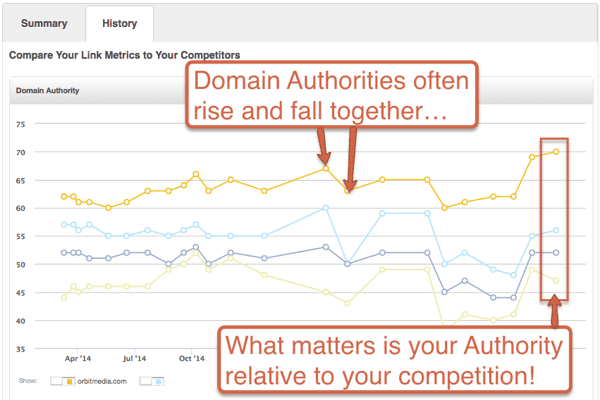
The Domain Authority of all websites rise and fall together, like boats on the tide.
10. Is Domain Authority a difficult thing to track and measure?
Let’s ask Matt to see if he has insights into reasons for potential inconsistencies.
 |
“Tracking Domain Authority against all 150+ billion pages in the Mozscape index is nearly impossible, so we focus on tracking Domain Authority on a subset of a few hundred thousand pages over time. Among other things, we monitor correlations vs Google rankings and the overall values of Domain Authority.” – Matthew Peters, Director of Data Science, MOZ |
11. How can I increase my Domain Authority?
If your DA is low, it’s much easier to raise it fast. As we saw in the curve above, a DA of 30 isn’t that much higher than a DA of 20. But it may take years of intense marketing to climb up from 70 to 80.
And how specifically do you boost this number? This is one of the best questions in all of marketing. We’ve written a lot on this topic. You’ll find answers to this question in these articles:
Here is a list of things that don’t directly affect your Domain Authority:
- Linking between pages on your website
They may pass authority from one page to another, but they don’t increase the authority of your overall domain. Follow these internal linking tips to pass Page Authority. - Linking to your website from Facebook, or any other social network
Sure, a link from Facebook is a link from a site with a DA of 100, but the link is on a profile, which is one of billions of pages on Facebook. That profile has a very low Page Authority, so passes almost to value along to your domain. - Linking to your site from a press release
Google knows that press releases are a special type of content. They appear everywhere as duplicates very suddenly. Few SEOs believe that press release links offer any SEO value. - Links from blog post comments
Links from comment system almost always include a special tag called NOFOLLOW. This tag specifically tells the search engine robot to not follow the link to it’s destination, and therefore, pass no authority.
So what does increase your Domain Authority? Good marketing.
Certain activities can lead to links directly. Here are a few:
- Bylined articles and guest blogging
- Providing contributor quotes
- Contributing to round-ups
- Providing testimonials
- Pitching articles to the media
- Submitting to directories
And here are some more powerful tactics, that might not lead directly to quality links and higher authority, but they often pave the way for huge long term benefits. Here are 30 activities that often attract links organically.
Blogging, Twitter chats, hosting webinars, hosting live events, public speaking, sponsoring events, podcasting, publishing original research, eBooks, whitepapers, embeddable infographics, being a guest on the radio, appearing on television, networking with influencers, writing books, advertising on websites, social media ambassador programs, email marketing, running contests, running online promotions, guerilla marketing, native advertising, affiliate marketing, winning awards, joining networking groups, joining mastermind groups with other marketers, and email outreach.
My best advice? Publish high-quality, original content and make it visible to people who create content.
Or just do something really interesting and newsworthy.
Link building (and link attraction) campaigns that increase Domain Authority are often very clever combinations of several types of marketing.
Special thanks to Lisa Loeffler and Amanda Gant for their help on this article.




